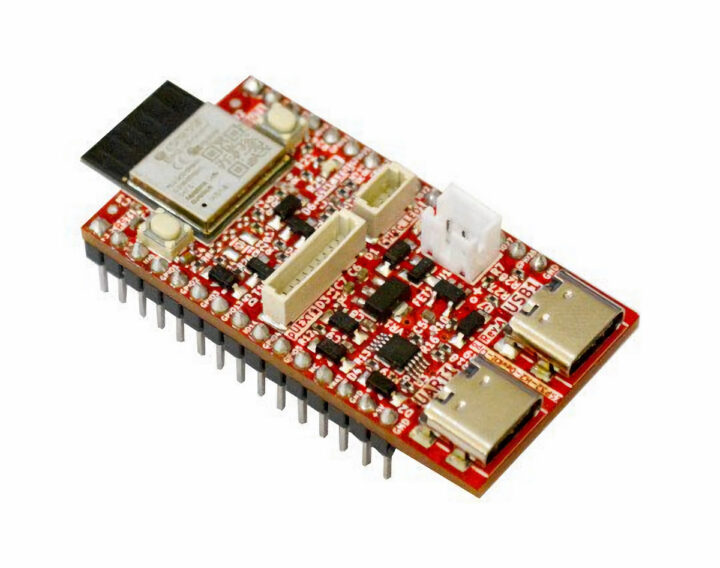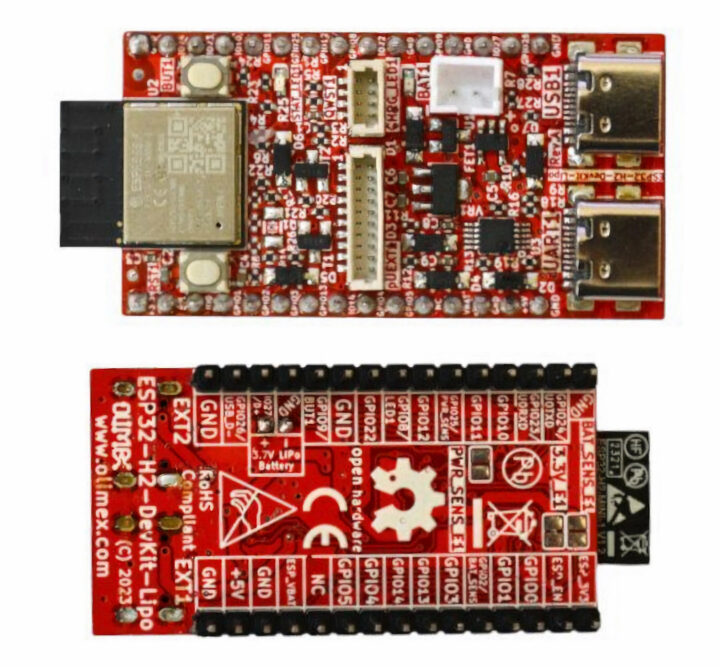Olimex ESP32-H2-DevKit-LiPo is an open-source hardware board based on ESP32-H2-MINI-1-N4 wireless module with Bluetooth 5 Low Energy (LE) and an 802.15.4 radio for Zigbee, Thread, and Matter connectivity, and that can be powered by a LiPo battery.
The ESP32-H2 RISC-V microcontroller is coupled with 4MB flash in the wireless module, and the board comes with two rows of 15 pins for up to 19 GPIOs with alternate functions such as ADC, SPI, UART, I2C, etc… plus pUEXT and Qwiic/Stemma connectors for expansion modules. The board also features two USB-C ports, one for connected directly to the ESP32-H2 and the other for USB to UART programming/debugging.
ESP32-H2-DevKit-LiPo specifications:
- Wireless module – ESP32-H2-MINI-1-N4
- MCU – Espressif Systems ESP32-H2 32-bit RISC-V microcontroller at up to 96 MHz with 320 KB SRAM, 128 KB ROM, 4 KB LP memory, Bluetooth 5.2 LE/Mesh and 802.15.4 (Zigbee/Thread/Matter) radios.
- Storage – 4MB flash storage
- PCB antenna
- Dimensions – 13.2 x 16.6 x 2.4 mm
- USB
- 1x USB Type-C port connected directly to ESP32-H2
- 1x USB Type-C with USB to Serial converter for programming and debugging
- Expansion
- 2x 15-pin headers with up to 19x GPIOs, ADC, SPI, UART, I2C, I2S, RMT, GDMA and LED PWM
- pUEXT connector
- Qwiic/Stemma QT connector
- Misc – Reset and user buttons; user LED
- Power Supply – LiPo battery charger and connector
- Dimensions – 48 x 25 mm
Olimex will eventually release PDF schematics and the full KiCAD hardware design files on GitHub and publish a user manual, but they haven’t done so yet since the board is only at the pre-order stage and will start shipping on January 31. But we already know ESP32-H2 is supported by the Arduino IDE and the ESP-IDF framework.
While it’s not the first ESP32-H2 board we’ve covered, it’s the first with support for LiPo battery as the official ESP32-H2-DevKitM-1 devkit and the low-cost WeAct ESP32H2-N4 board both lack a battery charging circuit. You can pre-order the Olimex ESP32-H2-DevKit-Lipo board for 8 Euros on the company’s online store.

Jean-Luc started CNX Software in 2010 as a part-time endeavor, before quitting his job as a software engineering manager, and starting to write daily news, and reviews full time later in 2011.
Support CNX Software! Donate via cryptocurrencies, become a Patron on Patreon, or purchase goods on Amazon or Aliexpress






